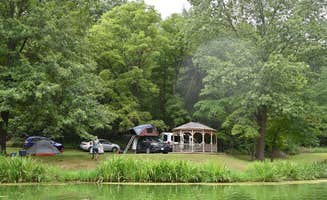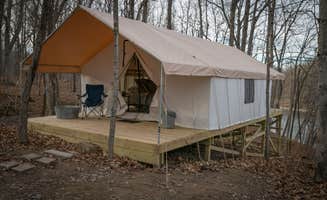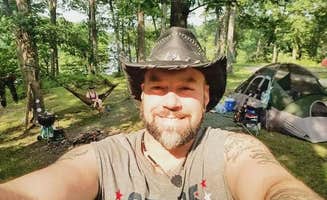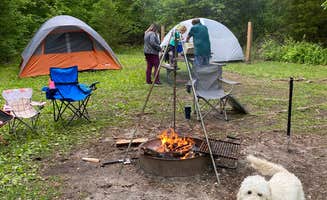Dispersed camping near Kane, Illinois offers access to several campsites within a 40-mile radius of town. The region sits near the confluence of the Illinois and Mississippi Rivers, creating diverse landscapes from wooded hills to river bottoms with elevations ranging from 400 to 700 feet. Summer temperatures typically reach the mid-80s with high humidity, while spring and fall camping seasons provide milder conditions with daytime temperatures in the 60s and 70s.
What to do
Hiking trails exploration: McCully Heritage Project features several trail systems with varying difficulty levels. One camper noted, "There's a house to rent or primitive camping trails have a map but need a little more marking on newer sections. Very well maintained. Neat look out points" (McCully Heritage Project).
Fishing opportunities: William R. Logan Conservation Area provides access to stocked lakes for fishing enthusiasts. According to a reviewer, "Free primitive campground near a lake in William Logan. No frills camping at about 8-10 sites near the main entrance off Route RA, with most being in an open circle configuration with the main road cutting through the middle" (Logan Wildlife).
Wine country exploration: Camping at Klondike Park places visitors near Missouri wine country. A camper explained, "This Campground places you in the heart of Missouri Wine Country and there's a perfect base for visiting the wineries and restaurants along highway 94" (St. Charles County Klondike Park).
Katy Trail access: Klondike Park offers excellent access to the popular Katy Trail for cyclists. A reviewer shared, "I have bike-packed along the Katy and this is an excellent spot for an overnight(s) stay. It is a tough, but short, climb from the trail. You may have to walk up the hill - challenge made."
What campers like
Privacy between sites: The best tent camping near Kane, Illinois often features separated camping areas. At Waverly Lake City Park, a camper noted, "My wife and I were homeless for a month and needed to break out the tents. We had a pleasant and fairly private experience. Each site is spread out and fairly well" (Waverly Lake City Park).
Multiple terrain types: Varied landscapes provide diverse camping experiences. A visitor to Klondike Park mentioned, "Campsites were great. Stayed at a walk-in site for a night and enjoyed it. Some sites are closer to the highway and cars flying down the road can make it hard to sleep but after midnight, they stopped. Trails are beautiful and perfect for families."
Affordable rates: Budget-friendly camping options exist throughout the region. A McCully Heritage Project camper stated, "Ten dollars a night helps maintain land and natural area, all donation, very family oriented."
Easy access for paddlers: Water access points make these sites attractive for kayakers and paddleboarders. A reviewer at McCully Heritage Project shared, "We have only stayed at the largest site as it has good fishing and a place for us to launch our paddleboards and kayaks."
What you should know
Seasonal insect challenges: Campers should prepare for insects during warm months. A Waverly Lake visitor warned, "Be mindful of field roaches and raccoons at night, as we had to learn the hard way the morning after our first night. Oh, and the mosquitoes are BRUTAL. Come prepared" (Dr. Edmund A. Babler Memorial State Park).
Stay limits: Some campgrounds restrict consecutive days. As noted at Waverly Lake, "There's also a 4 consecutive day per month limit."
Wildlife encounters: Nocturnal visits from local wildlife are common. A reviewer at Babler State Park stated, "The only issue is the raccoons. They dont give a darn who you are. They will walk right up to, smile, and take your chips. Scandalous!"
Facility limitations: Many sites have minimal facilities. At Logan Wildlife Conservation Area, a camper observed, "The only vault toilet was closed and a porta potty was set next to that. There is also a lollipop loop with some really primitive and obviously rarely used campsites in the woods behind the main camp area."
Tips for camping with families
Playground access: Some campgrounds offer play equipment for children. At McCully Heritage Project, a visitor mentioned, "I just love the bridge across the pond. We had a picnic and the kids got to play on the playground equipment" (McCully Heritage Project).
Shorter trail options: Look for parks with family-appropriate hiking distances. A Babler State Park visitor noted, "The park has a lot to offer. The trails are not too long but can be challenging for small kids or folks that are not used to hiking."
Water recreation: Lakes and ponds provide additional activities for families. One camper at Klondike Park shared, "There is a sandy beach area surrounding the water, making it a great place either lay in the sun or to go fishing."
Bring tick prevention: Parents should check children regularly for ticks after outdoor activities. A McCully Heritage visitor advised, "Watch for ticks. Don't be alarmed if you see cats or the neighbors dogs roaming around the site. They are friendly."
Tips from RVers
Site selection for larger vehicles: RV campers should research specific site dimensions. At Babler State Park, an experienced RVer advised, "The camp hosts we encountered are very helpful and have a list of site lengths and can tell you which ones are appropriate for large RVs" (Klondike Park).
Limited hookup options: Most tent camping areas near Kane have few or no hookups for RVs. A Babler State Park reviewer noted, "What we liked about this campground was the comfortable feel of being at a state park with plenty of trees, hiking trails, space between sites, but also the convenience of having a level, paved site with electricity."
Road navigation challenges: Some campground roads have tight turns challenging for larger RVs. As one Babler State Park camper explained, "The roads are paved and big rig-friendly (with the exception of one loop that is clearly marked 'short turning radius')."





